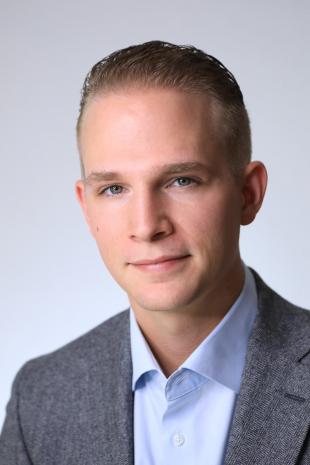Post date:
Name: Dylan Pilarski
Programme: MSc in Advanced Chemical Engineering (ACE)
Hometown: Wayne, New Jersey, USA
Why did you choose to study your MSc programme at the University of Edinburgh?
I had heard from alumni that the School was academically challenging and I was enticed by the thought of an intensive programme with a small class size when compared with 1.5 or 2-year programmes at other European or American institutions.
How would you explain your MSc topic - advanced chemical engineering - to a non-expert?
From the perspective of its application to industry, chemical engineering is concerned with transforming raw materials into useful, everyday products in a safe and economical way. Generally speaking, this involves taking data from pilot or laboratory studies and scaling as appropriate. However, many different paths are available for those pursuing chemical engineering that may not even overlap with end-of-line products, such as molecular simulation, systems modelling or laboratory based ‘proof of concept’ studies.
The ACE programme provides students with the opportunity to evaluate all of these routes based on personal interest without restricting students to purely industrial application. In my case, I desired to stay out of the lab and pursue more simulation-based applications.
Overall, studying chemical engineering involves understanding the processes needed to manufacture products, while helping to manage natural resources and ensure sustainability and safety concerns are addressed. As such, one can imagine the immense range of potential career paths that are available for practising chemical engineers.
What aspects of the Programme have you enjoyed most?
I really enjoyed the number of options and variations available between classes and thesis topics, allowing a really customizable education in terms of exposure to content and even software packages.
I also appreciated that several classes required report writing to some extent and did not always rely entirely on a final exam for grading, balancing out the Programme load throughout the year.
Outside of your studies, what were your highlights of being a student at Edinburgh?
The city is beautiful and though the weather can be bleak, when coupled with the warmth of store-fronts and cafes, really lends itself to studying. The pubs are quite good as well!
Is there anything that the School has done to help you to make the most of your time here at Edinburgh?
The support is fantastic and unlike anything I have experienced at other institutions. I could not commend staff and lecturers more in their efforts to help students whenever possible.
The help available with publishing in scientific journals was also greatly appreciated and really provided an extra kick to succeed. For instance, I was encouraged to publish a review paper based on the state-of-the-art regarding alcohol-free beer production in the Journal of Food Engineering (Pilarski & Gerogiorgis 2019) during the programme and then a conference paper (ESCAPE 30) towards the end of the programme based on my thesis results garnered through dynamic modelling and simulation of fermentation.
What do you plan to do next? Has your time at Edinburgh helped to shape your career goals?
I have recently secured a project management position at Stepan Company, one of the largest manufacturers of surfactants - a key ingredient in consumer and industrial cleaning compounds - in the world. My immediate future will involve acclimating back into my career and improving my skills.
My time at Edinburgh really served to provide perspective and greater context as to what I enjoy and what I wish to pursue, hopefully leading me back one day to an academic environment in some capacity.
Is there any advice you would give to prospective students thinking about studying your Programme at Edinburgh?
I would recommend paying attention to any advice given by staff regarding time management – the course load can feel quite high and they speak from experience.
Also, enjoy yourself as much as you can outside of class as the year passes all too quickly!
References
Dylan W. Pilarski, Dimitrios I. Gerogiorgis, PROGRESS AND MODELLING OF COLD CONTACT FERMENTATION FOR ALCOHOL-FREE BEER PRODUCTION: A REVIEW, Journal of Food Engineering (2019)
Dylan W. Pilarski, Dimitrios I. Gerogiorgis, DYNAMIC MODELLING AND SIMULATION OF COLD CONTACT FERMENTATION (CCF), European Symposium on Computer-Aided Process Engineering (2020).



